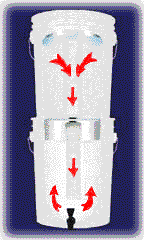THE CASE OF THE LURKING PLANET
"Far beyond the
solar system's nine known planets, a body as massive as Mars may once have
been part of our planetary system -- and it might still be
there;”
The lead paragraph in a science-fiction
script?
The lead paragraph from an article by Zecharia Sitchin about
Nibiru?
No.
It is the lead paragraph in a report in Science News of April
7, 2001 headlined "A Comet’s Odd Orbit Hints At Hidden
Planet.”
The article reports the conclusions of
an international team of astronomers who have studied an unusual comet discovered
last year, designated 2000 CR/105. It follows a vast elliptical orbit around our Sun –
an orbit that takes it way out to some 4.5 billion kilometers from the Sun,
and brings it back at its closest to the Sun to the vicinity of Neptune;
it is an orbit whose period “takes roughly 3,300 years” (according
to Sky&Telescope News of April 5, 2001).
“Such an oblong orbit is usually
a sign that an object has come under the gravitational influence of a massive
body," wrote R. Cowen in Science
News. Was this the gravitational
pull of Neptune? In a study
to be published in the Journal Icarus, the team of astronomers (led
by Brett Gladman of the Observatoire de la Côte d'Azur in Nice, France),
after analyzing all the possibilities, does not think
so. An alternative solution,
they say, is that “the comet's orbit could be the handiwork
of an as-yet unseen planet”
-- as massive as Mars -- "that would have to lie some 200 AU from
the Sun," in the so-called Kuiper Belt of cometary and other planetary
debris. This would also explain
"why many members of the Belt have orbits that angle away from the plane
in which the nine known planets orbit the Sun."
“Undoubtedly, something massive knocked
the hell out of the Belt," Harold F. Levison of the Southwest Research institute
in Boulder, Colorado, told the magazine. “The question is whether it
is still there now."
“Comet’s
Course Hints at Mystery Planet,” was how the journal
Science headlined the discovery news in its issue of 6 April
2001. The special report, written
by the Dutch astronomer Govert Schilling, summed up the findings in the following
lead paragraph:
"A Supercomet following
an unexpectedly far-flung path around the sun suggests that an unidentified
planet once lurked in the outermost reaches of the solar system, an international
team of astronomers reports.
What's more, the mysterious object may still be
there."
Now, As the Sumerians
Said…
Readers of my books may well join me now
in saying: So what else is
new?
Ever since the publication of my first
book (The 12th Planet) in 1976 I have asserted that Sumerian and other
ancient Near Eastern texts and depictions showed familiarity with a complete
Solar System that included, beside the Sun and the Moon, ten (not nine) planets
-- the tenth planet (or twelfth member of the Solar System) having a vast
elliptical orbit that lasts 3,600 years. Its Sumerian name was
Nibiru.
I have-suggested that Sumerian/Akkadian
texts such as Enuma Elish (also called the Babylonian Epic of Creation) were
not mythological tales, but records of sophisticated advanced
knowledge. Establishment scientists
and scholars (see a previous article, The Case
of the Misplaced Teapot, as an example) resist such an inevitable
conclusion because it requires the acceptance of the ancient claim that Earth
had been visited by Extraterrestrials, the ANUNNAKI ("Those Who From Heaven
to Earth Came") of Sumerian lore.
According to the ancient texts as interpreted
by me, Nibiru was a planet ejected from some other planetary system in outer
space that was captured into our Solar System as it passed near
Neptune. It became involved
in a collision with a pre-existing planet where the debris of the Asteroid
Belt are now. As a result of
that collision, some 4 billion years ago, the Earth and the Moon came to
be where they are now.
And, what do you know? In an article titled
Neptune Attacks! In the 7 April 2001 issue of the magazine New
Scientist, Ivan Semeniak wrote thus:
“There is new
evidence that a sudden barrage of deadly debris crashed against the Earth
and the Moon 3.9 billion years ago… What triggered this
onslaught? Something in the structure of the Solar System must have
changed.”
The “something,” I am more certain
than ever, was Nibiru.
May
2001
ZECHARIA SITCHIN
© Z. Sitchin 2001
|
Reprints must state:
© Z. Sitchin
Reprinted with permission |




























